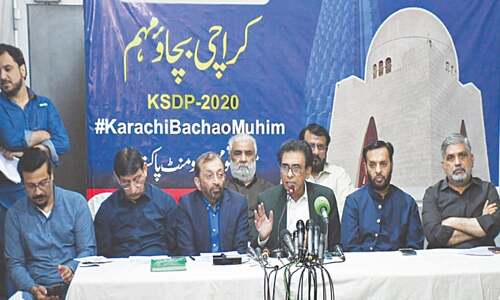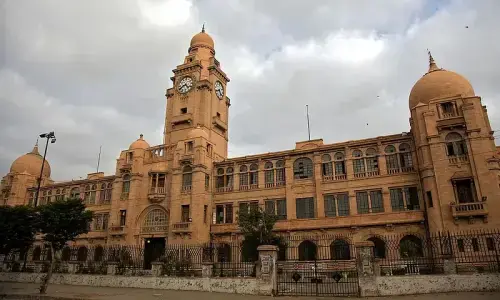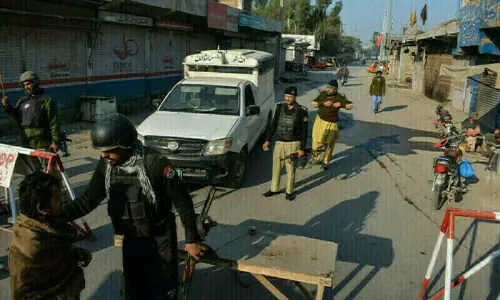KARACHI: The 4th Conference on Postcolonial Higher Education having the theme ‘Reparative Futures: Decolonial Thought in the Global Ruins’ organised by Habib University began online on Monday night.
Jean-Baptiste Fressoz, historian of science, technology and environment, Centre National de la Recherche Scientifique in Paris, was the first speaker.
He began his presentation by showing an image of a painting from the 19th century. He called it an important artwork in the context of colonial discourse — both in French and British colonial discourse. He argued that the idea that colonisation was restoration of nature was central to the justification of colonisation.
He said in 1830, France invaded Algeria; and for French settlers and colonists, it was important to describe Algeria as a ruined country that had been deforested, degraded by centuries of conquest. It was a racist discourse. “It is interesting to see how much the discourse was embedded in controversies around deforestation and environmental degradation.”
Five-day conference on postcolonial higher education under way
Mr Fressoz said half a century since anthropogenic climate change linked to deforestation was discussed in France the idea that we had to repair nature was put forward. The discourse on climate change at the time was centred on forests. The main argument was that by cutting down forests people were altering the climate, changing the cycle of water. It was well known then that trees had an important role in water cycle. Each plant or tree was a small kind of generator of vapour. Colonisation in this context was thought to be a way to repair the environment which had been destroyed — a climatic restoration.
In the early 19th century in France, the state ordered a national inquiry on climate change and deforestation. At the time the government was blaming the French Revolution for it. They had described the south of France as already degraded, initiating a programme of regenerating nature by planting trees. “So repairing nature was clearly embedded in the narrative of colonial justification,” he said.
George Weiblen of the University of Minnesota was the second speaker. He started off by saying that as a natural scientist, a botanist, he found it quite unlikely to tell the story that he was about to [because] “there’s a lot we need to think about the past if we’re to envision a reparative future”. He said he was born and brought up in Minnesota. His ancestors were German immigrants who came to Minnesota in the 1860s. His great-great uncle fought in the Dakota war in 1862. He grew up in the place loving America and National Geographic, reading about far-off exotic places. He was raised as an explorer, studying nature, with a strong desire to travel.
It was not until a few years ago that he found himself circling back to the place that he’s from, the place that gathered attention of the world at different points through history, most recently with the murder of George Floyd, less than a kilometre from the public school that he (Weiblen) attended — an intentionally desegregated public school. It’s also the first district to elect a Muslim to the US Congress.
He then narrated the tale of how he got from Minnesota to the island of New Guinea to learn about his history that brought him back home. “Here we are in the Anthropocene, as a human species so successful that we’re harnessing most of the earth’s fresh water, cultivating almost half of the earth’s arable land, we are using a tremendous amount of energy, so successful feeding ourselves that our ecological systems are strained. As a student of botany I was attracted to the myth of going to exotic places and discovering new species … This goes back to the age of European exploration. [And] you think about how much indigenous ecological knowledge passed down through generations was appropriated to build this economy.”
Mr Weiblen said New Guinea was famed for its cannibal history and wildness. From a biological perspective it’s a big hotspot, topographically rugged, much of it uninhabitable, too wet or too steep. Today it’s a deforestation hotspot.
He said due to the independence of its eastern half of the island, Papua New Guinea, in 1976 and by virtue of its constitution, the customary land rights of its people are acknowledged; 98 per cent of the land belongs to customary landowner groups. “After spending half my life commuting from Minnesota to New Guinea, I discovered the relationship between cultural diversity and biological diversity. There’s a linguistic map of the whole island. There are over 1,000 spoken languages. They represent waves of human migration that go back at least 50,000 years.”
Quoting a colleague’s research on the subject of biodiversity crisis, he said: “The rate of linguistic extinction is 10 times higher than the rate of biological species loss.”
A great example, he pointed out, is of Europe where 90pc of 250 languages spoken in the region are not spoken by the children today. Most of them are spoken by parents or grandparents of those children. “So we’re looking at a massive loss of cultural knowledge,” he bemoaned.
Earlier, Prof Shah Jamal Alam introduced the two eminent scholars to the online audience.
The conference will conclude on March 27.
Published in Dawn, March 24th, 2021



































